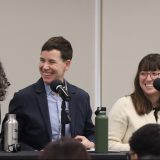
Defining Democracy: Democratic Commitment in the Arab World
November 16, 2023
Assistant Professor Hannah Ridge (Political Science) recently published her first book, Defining Democracy: Democratic Commitment in the Arab World. The book focuses on how Arabic-speakers in the Middle East use the word dimuqratiyya. The English translation – democracy – fails to capture the nuance of how the word is employed, according to Dr. Ridge.
“When people say they want a dimuqratiyya government, they are saying they want a government that works for the people, with freedom and social justice, not corruption and inequality,” said Dr. Ridge.
The Voice of Wilkinson sat down with Dr. Ridge to discuss her research and her first publication.
Voice of Wilkinson: First and foremost, congratulations on your first publication. How does it feel? 
Hannah Ridge: It’s great to have it out in the world. Writing it was a long process – I first had the idea in 2018. Then there was a lot of data gathering, analysis, and framing and re-framing to make it accessible to a wider audience.
VoW: Tell us a little about the book and why you wrote it.
I wrote it because I am interested in democracy, languages, and how we measure things. For a long time, political science looked at the Middle East as paradoxical because there was high public support for “democracy” but little democratization. Really, because of the differences between democracy and dimuqratiyya, we’ve been overstating how much citizens are interested in democracy to the exclusion of all other systems. In fact, we do this with Americans too. Many Americans who say they support democracy are not averse to non-democratic alternatives.
VoW: What do you hope readers will learn from your book?
HR: I want them to think about how we use words and whether we really know as much about popular democratic commitment as we think we do. I fear we have been overstating world interest in democracy in general, especially when it comes to democracy being the one and only option. Many people are open to different regime types, like expert rule or military rule, even if they are not in the streets pushing for them right now.
My research focuses on when citizens who have democracies are satisfied with the democracy they have and when citizens who do not have democracies want them or not.
VoW: What is your current research project?
HR: I’m getting more into the role of ethnicity in Middle East politics, particularly as it connects to religious and democratic attitudes. For instance, when do people think ethnicity and religion overlap and what happens to democratic attitudes when confronting ethno-religious politics.
My second book is with the publishers now. It’s about ethnicity in the Jewish Israeli population. I had a lot of fun writing that one. We need to internationalize our thinking about race and ethnic politics; that field is currently very America-centric. I’m happy to be pushing the borders a bit there.
VoW: Exciting! We look forward to reading it!

